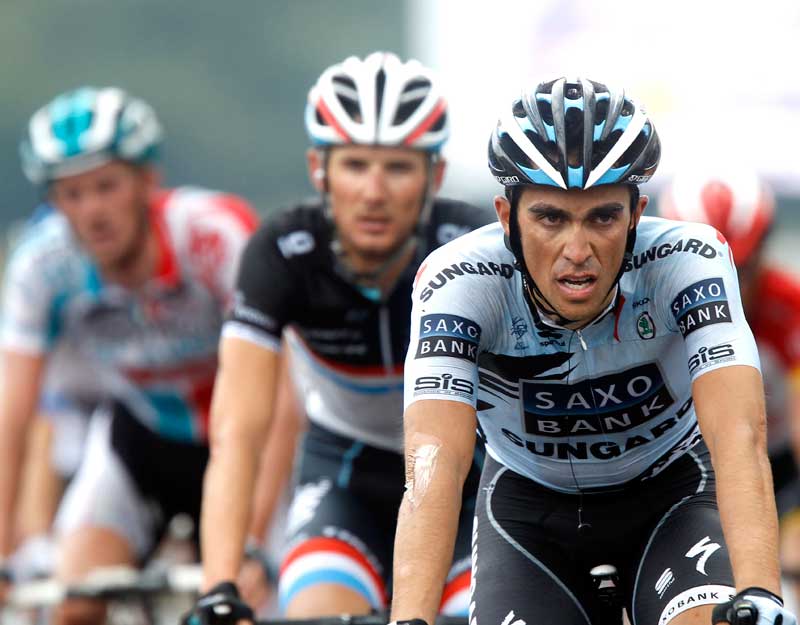Contador clenbuterol appeal case looms

The latest race content, interviews, features, reviews and expert buying guides, direct to your inbox!
You are now subscribed
Your newsletter sign-up was successful
In just under a week's time, a case which supposedly began with a cyclist eating some prime beefsteak on the second rest day of the 2010 Tour de France will start to draw to a close, in an office somewhere in Lausanne, Switzerland.
For four days, from November 21-24, the Court of Arbitration for Sport in Switzerland will go over the case of Alberto Contador - the triple Tour winner who tested positive for banned substance clenbuterol, was cleared by his federation of doping, but whose sporting future is now subject to an appeal by the UCI and WADA.
Contador claims that his positive - for a tiny amount of clenbuterol, but a positive nonetheless for a banned substance for which he could face up to a two-year ban - was due to eating a contaminated beefsteak, brought to him by friend Jose Luis Lopez Cerron from Spain as a special treat, on the 2010 Tour's second rest day.
The case broke in late September last year, when an ashen-faced Contador insisted in a packed news conference that he was innocent. After a six-month period in which the case shuffled back and forth at a snail's pace between the UCI's offices and Spain, despite a recommendation to the contrary his Federation's verdict was: Contador was innocent.
Since then, and despite the announcement in late March of an appeal by the UCI and WADA against that verdict, in May Contador won the Giro d'Italia. He then finished fifth in the Tour de France.
Since then, too, five cases of clenbuterol positives attributed to contaminated meat - beef and chicken - during a Concacaf football tournament in Mexico have emerged. The football players involved, all Mexicans, were cleared of doping.
WADA initially appealed against that verdict but later dropped it saying it had "subsequently received compelling evidence ... that indicates a serious health problem in Mexico with regards to meat contaminated with clenbuterol."
The latest race content, interviews, features, reviews and expert buying guides, direct to your inbox!
Serious, it later turned out, was an under-exaggeration. A further 109 cases of clenbuterol positives, all apparently caused by contaminated meat, emerged during FIFA's U-17 World Cup in Mexico in June.
Like Contador's, most of the players' positives were for levels below that required to be reported by anti-doping labs - but positives they were. (The winning side, Mexico, did not have any positives, but after the five positives in the senior squad, the juniors wisely stuck to eggs, vegetables and fish).
Meanwhile, the Contador case ground on with further delays caused by requests for extra time by WADA and by Contador's team. The Spaniard's legal team are expected to base their defence around the contaminated meat argument, and say the Mexico cases strengthen that defence.
WADA, some media reports say, will counter-claim that in Europe testing is better than in Mexico, and therefore the chances the beefsteak in the 2010 Tour was contaminated are too small to let the verdict of innocent stand.
After his recent wedding to long-standing girlfriend Macarena Pescador, Contador himself is on his honeymoon in the Caribbean and is not expected to return to Europe until later this week. He is not expected to give interviews - and has not done so for weeks.
Given the man at the centre of affairs is keeping mum, the press is filling in the ensuing vacuum as best it can.
On Friday, one of Spain's best-selling dailies, El Mundo, claimed that WADA have said they have turned down requests to fund a fledgling test for plasticizers which was supposedly used to investigate the possibility of a blood transfusion in Contador.
WADA turned down the grant application, agency spokesman Terence O'Rorke told the news agency Bloomberg, because there are ‘alternative ways' to collect evidence of transfusions. As a result, scientists have no plans to continue their research, and the test will be shelved.
Rival paper El Pais provided its own update on Monday with what it claimed - although it provided no sources - was a breakdown of the 23 people due to pass through the witness boxes in Lausanne in four days time.
Apart from Contador himself, El Pais claimed three of his former Astana team-mates - Benjamin Noval, Jesus Hernandez and Paolo Tiralongo - various anti-doping experts and an American polygraph (lie detector) expert would step up in his support. On the other side amongst the star witnesses would be the butcher from Irun, Spain who sold Contador's friend Jose Luis Lopez Cerron the offending beefsteak when Cerron was en route to Contador's hotel in Pau.
Cycling Weekly's requests for confirmation or denial of El Pais' report from Contador's press office were met with a repeated ‘no comment'. However, with the case now up for trial in CAS, comments or not, it is now close to being resolved - and one way or another, one of the most surreal doping affairs of recent times will draw to a close.
Related links
Comment: Cycling is already the loser in Contador case
Contador's clenbuterol case in brief: history and links
British cyclist banned for two years for EPO use
Founded in 1891, Cycling Weekly and its team of expert journalists brings cyclists in-depth reviews, extensive coverage of both professional and domestic racing, as well as fitness advice and 'brew a cuppa and put your feet up' features. Cycling Weekly serves its audience across a range of platforms, from good old-fashioned print to online journalism, and video.